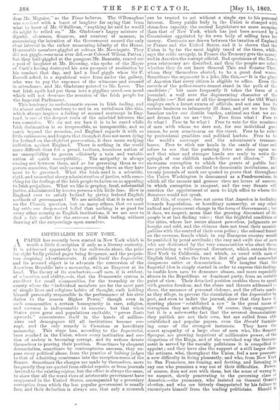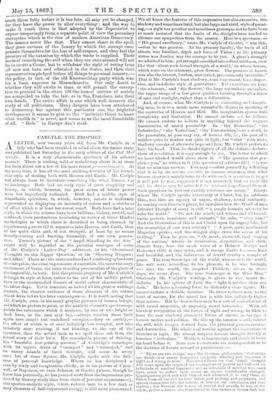IMPERIALISM DT NEW YORK.
PAPER has recently been started in New York which is 11 worth a little description if only as a literary curiosity. It is addressed apparently to the well-to-do alone, the price for eight badly printed pages being fivepence, and the proprietors despising advertisements. It calls itself the Imperialist, and its avowed object is to advocate the conversion of the American Republic into a monarchy, with an Emperor at its head. The theory of its conductors,—all men, it is evident, of education and ability,—is, that the Democratic system is excellent for small communities, for the township or the county where the "individual members are for the most part of simple lives and religious habits of thought, each holding himself personally responsible in the performance of his civic duties to the unseen Higher Power," though even in such communities a certain homogeneity in race, religion, and customs is indispensable to success ; but that when States grow great and populations excitable, "power floats upwards," concentrates itself in the hands of millionaires and demagogues till all institutions become corrupt, and the only remedy is Cmsarism or hereditary monarchy. This stage has, according to the Imperialist, been reached in the Union, where every institution and section of society is becoming corrupt, and its writers devote themselves to proving their position. Sometimes by eloquent denunciation, sometimes by contemptuous sarcasm, they expose every political abuse, from the practice of bribing judges to that of admitting courtesans into the reception-room of the Senate. Sometimes the charges are made by themselves, more frequently they are quoted from official reports, or from journals devoted to the existing re'gime, but the effect is always the same, to show that all the worst vices of aristocratic government have reappeared in the United States, accompanied by a pecuniary corruption from which the less popular government is usually free, and their deduction is always one, that only a monarch
can be trusted to act without a single eye to his personal interest. Every public body in the Union is charged with shameless rapacity, the central Legislature no more escaping than that of New York, which has just been accused by a Commission appointed by its own body of selling laws for money. Contrasts are drawn between the taxation of England or France and the United States, and it is shown that the Union is by far the most highly taxed of the three, while, says the critic savagely, in France the Treasury gets the money and in America the corrupt official. Bad specimens of the European aristocracy are described, and then the people are asked whether they do not know General This and Senator That, whom they themselves elected, to be a great deal worse. Sometimes the argument is a joke, like this,—" It is the glory of America that every citizen is eligible to office. Even the records of the police-courts cannot stand in the path of th candidate ;" but more frequently it takes the form of a jeremiad, a wail over the degenerating character of the Republic :—" Not one of all the despotisms of the Old World employs such a locust swarm of officials, and not one has its various business so infamously ill done, and yet we bow like Issachar under our double burden, national ass that we are, and dream that we are free.' Free from 'what? Free to do what ? Free to be 'what? Free to vote for the nominees of men with whom we dare not, for our individual good names, be seen arm-in-arm on the street. Free to be ruled by professional gamblers and political harlots. Free to be the world's contempt and the adventurer's treasure. house. Free to stick our heads in the sands of time and refuse to see that the puisuing fates are close upon us. and that wiser and stronger hands are ready to write the epitaph of our childish make-believe and illusion." The enormous corruption to which the grants of public land have given rise is all credited to democratic institutions, and twenty journals of mark are quoted to prove that throughout the Union Washington is denounced as a Pandemonium, in which all the meaner and grosser vices are levers of success. in which corruption is rampant, and the very Senate will sanction the appointment of men to high office to whom the Senators would not speak.
All this, of course, does not mean that America is inclining towards Imperialism, or hereditary monarchy, or any other radical and permanent change in the form of Government ; but it does, we suspect, mean that the growing discontent of the people is at last finding voice; that the frightful condition of the cities, where law seems almost powerless, judgments are bought and sold, and the citizens dare not trust their municipalities with the control of their own police ; the colossal frauds on the revenue, frauds which in any European country would be punished by penal servitude ; the easy and swift rise of men who are distrusted by the very communities who elect there, are producing a wide-spread discontent, which extends from New York to California, and which, as usual with men of English blood, takes the form at first of grim and somewhat dangerous satire or denunciation. We imagine that the Imperial idea is simply started in order to express this feeling. to enable keen men to denounce abuses, and more especially abuses in the Republican or dominant party, from an outside point of view. Their detached position enables them to speak with greater freedom, and the abuse and threats addressed to them, the menaces of personal violence, and the efforts made. as they allege, to prevent the circulation of the Imperialist by post, and even to indict the journal, show that they have in sporting phrase "established a raw " in the great mass of corruption they are attacking. Of course, they exaggerate: but it is a noteworthy fact that the severest denunciations they publish are not their own, but are culled from old established and popular papers, even the Herald furnishin,g some of the strongest instances. They have the secret sympathy of a large class of men who, like Senator Sprague, are growing impatient of millionaire power, of the despotism of the Rings, and of the wretched way the Government is served by the rascally politicians it is compelled to appoint ; and they have also the support of a still larger class, the artizans, who, throughout the Union, feel a new pressure. a new difficulty in living pleasantly, and who, from New York to San Francisco, are fuming, and fretting, and listening to any one who promises a way out of their difficulties. Power. of course, does not rest with them, but the sense of wrong is. we suspect, slowly penetrating to the governing class e.f America,—the yeomanry, who insisted on General Grant s election, and who are bitterly disappointed by his failure to emancipate himself from the trading politicians. Should it reach them fully before it is too late, all may yet be changed, for they have the power to alter everything ; and the way to make it reach them is that adopted by the Imperialist, to expose unsparingly from a separate point of view the pecuniary corruption which is the vice of modern American Democracy. The masses never like that. They cannot share in the spoil, they grow envious of the luxury by which the corrupt compensate themselves for the loss of self-respect, and they feel the pressure of the taxation by which the waste is supplied. Their mode of remedying the evil when they are once aroused will not be to create a Omar, but to withdraw the right of voting from all men not born and educated in the States, and then elect representatives pledged before all things to personal honesty,— the policy, in fact, of the old Knownothing party which was, for a time, supreme in Massachusetts. Our only doubt is whether they will awake in time, or will permit the corruption to proceed in the cities till the honest section of society are compelled to take the law, as in San Francisco, into their own hands. The entire affair is one which well deserves the study of all politicians. Many dangers have been attributed to democracy, but against this particular one, the frightful development it seems to give to the "inebriate thirst to know what wealth is," is novel, and seems to us the most formidable of all. " Reds " in Europe don't steal.































 Previous page
Previous page